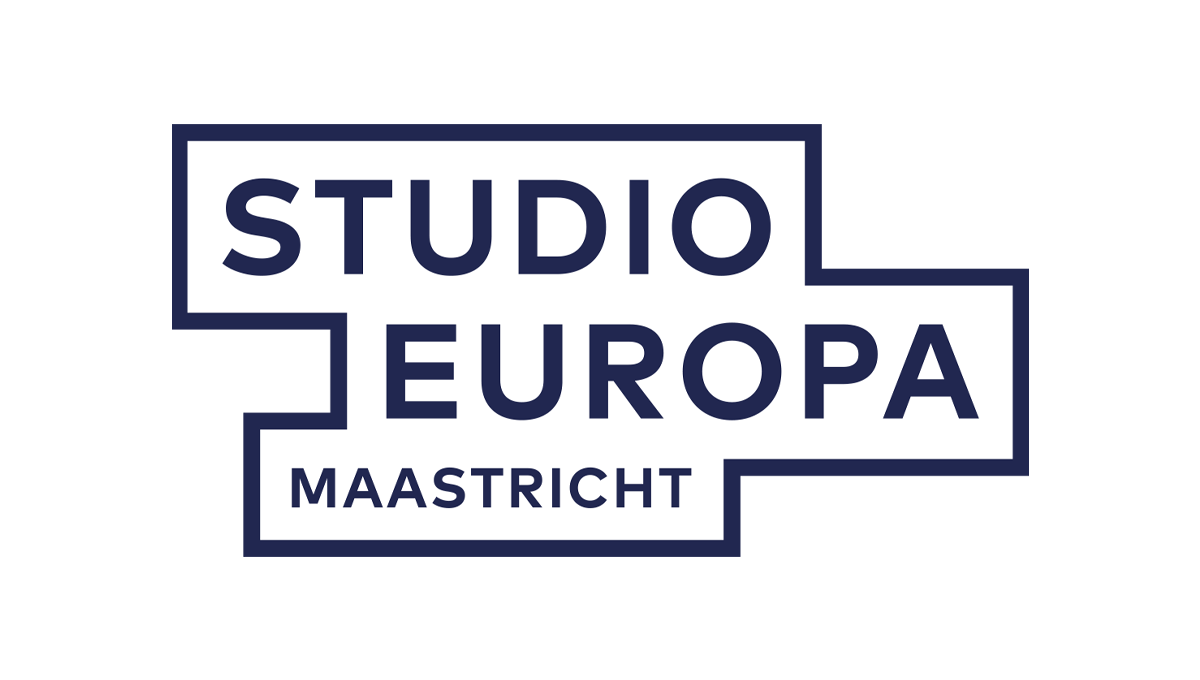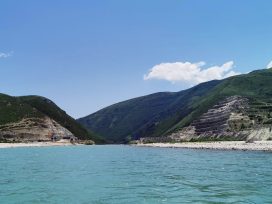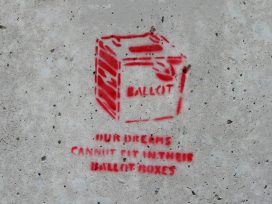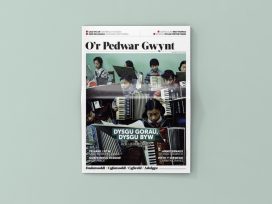Apocalypse in the rear-view mirror
The planet, as authoritarian capitalism’s plaything, is subject to real-world economic-ecological downward spirals. And yet exorbitant space exploration projects continue to build escapist dreams on extractivism. And the threat of nuclear war continues to push at the limits of tenuous environmental stability.
Earthrise reloaded
When the Tesla Gigafactory opened in Brandenburg, Elon Musk faced the press. The RBB (Rundfunk Berlin-Brandenburg Television), for example, wanted to know where he stood on the threat to groundwater in the region. Musk: ‘This region has so much water, look around. There is water everywhere here, does it look like a desert to you?’
Later, Musk demanded that the station edit out the question, as if he also wanted to give an answer to all those in Brandenburg who believe that here, in this region transformed from coal mining to smart post-extractivism, it’s not ‘a flourishing landscape’ that’s emerging but ‘a desert’.
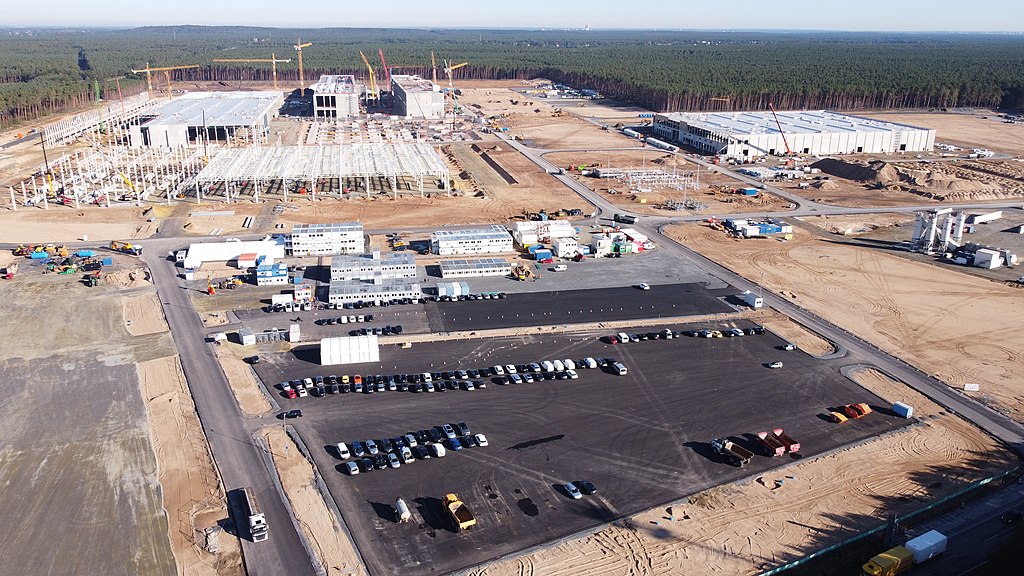
Tesla Gigafactory Berlin-Brandenburg. Image via Wikimedia Commons
From a desert in the Brandenburg hinterland that haunts the collective consciousness to a desert in the Arabian Gulf: in advertisements for the growing space enthusiasm in the region (‘Arabs to Mars!’), the desert is repeatedly invoked. These are imaginary images, for example of ‘smart cities’ on a sand-coloured Mars, that suggest a demonstratively post-fossil and downright ‘green growth’ into the transplanetary vertical.
However, the related space programmes actually necessitate an increasing consumption of fossil fuels (keyword: energy-intensive space programme), and not only leave the destructive logic of capitalist growth untouched but, in fact, extend it (Özgün Eylül İşcen, 2022).
Symptomatic of this is a motif illustrating a call for the ‘Arab Space Pioneers’ recruitment and training programme: dressed in the traditional garb of the region, a man standing on desert soil waves the United Arab Emirates’s flag; on the horizon: the Earth.
It is a variation on the Earthrise motif from 1968; here the view from the moon at that time is directed from Mars to Earth. The message: ‘There, on Mars, it’s like home.’ That’s why the man doesn’t need a gas-tight protective suit to protect his vital functions – particularly breathing – in the vacuum of space.
This visualization of a supposed utopia on Mars makes tangible the very realities that have been repressed on Earth: If it is like home there, on Mars, then perhaps it is because ‘we’ here, on Earth, will soon need both breathing protection and special suits day in and day out to cope with the consequences of environmental destruction.
Admittedly, the idea that ‘we’ will start wearing spacesuits here in view of the increasing uninhabitability of the Earth is absurd. The horrendous cost is a reminder of the high resource consumption and extreme inequality of this protective option: in the 1970s, a spacesuit cost between 15 and 22 million US dollars; today, about a billion. It should also be clear that protective clothing of this kind is no more a proven means against earthly ecocide than smart cities on Mars.
The challenge is to question capitalist growth as an operational process and ideology, rather than presenting ever more outlandish ‘solutions’ that perpetuate it.
Limits to growth
This much is certain: the ruling class will not question capitalist growth, as it is too much a component of their business and domination models. How important it is in securing this class’s power becomes apparent even when no growth can be recorded: the repression and propaganda apparatus then runs at full speed and suggests ‘negative growth’. In this way, even in times of depression, de/inflation and crisis, some form of growth can generally be reported. Even if ‘negative,’ that’s better than questioning growth as such – not to speak of introducing alternatives like ‘degrowth’. The challenge for class struggle, then, is to question both growth and power. This is easier said than done. Revolution? At present, it is up to the ruling class to ask questions of power.
Those who today pose the question of power from above do not want to shake up power relations as such. Rather, it is about bolstering one’s own position or upgrading one’s position in the power hierarchy. Accordingly, to give an example, the Ukraine invasion is a demonstration of power intended to show the West that Russia’s position as a great power (not recognized by the West) which can shape its geopolitical spheres of influence as it sees fit, will be claimed with brute force if worse comes to worst. The fact that this demonstration of power at the level of foreign policy is also due to domestic political conditions, such as the interrelated decline in Russia’s economic performance and the Putin regime’s democratic legitimacy, is often overlooked.
But it is precisely the domestic dimension that provides insight into power relations and the function of the power question – not only in the sense that ‘foreign policy adventures’ distract from economic, social and political ‘crises at home’ and at the same time help (consensually or by force) restore the stability of power relations (qua patriotism or repression). More important than this truism is that what is often omitted from the discourse (here: domestic political conditions) is not simply ‘the real truth’, but can be understood as a misappropriated aspect that brings the complex situation to light in the first place. After all, how should even (imperial) growth be possible if the capital elites systematically sell off the country’s natural resources without investing in the industrial and social infrastructure, thus creating an expandable basis for their fossil capitalism?
By relating foreign and domestic politics, for example by adapting and further thinking leftist theories on imperialism, the Putin regime’s desired demonstration of power appears as an effort that was born out of a crisis and that as such cannot actually contribute to overcoming this very crisis but only intensify it. The dilemma of the state oligarchy refers not least to the irresolvable contradictions of the economic-ecological complex. This complex can be described as a vicious circle that produces pandemics, extreme weather events, the slow violence of climate catastrophe and, indeed, wars – in other words, it can be described as an economic-ecological downward spiral that has led capitalist societies to the limits of growth. Growth-oriented economic activity has caused irreparable damage to the environment, thus also destroying economic foundations – not to mention the foundations of life.
Just in this delicate phase, in which the energy-intensive cycles of capitalism (especially production and reproduction) are increasingly unstable and crisis-prone, resources are being deployed more massively than ever as geopolitical and geo-economic weapons – in a war that is not only a war between Russia and Ukraine but that has also grown into an inter-imperial proxy war between Russia and the West, a ‘small world war’ that is being waged not least as an economic war. At first glance, fossil fuel companies and (especially Western) arms manufacturers may appear to be the winners. And the question arises whether this war marks a turning point because the growth forced by these players can only be had at the price of apocalypse – whether caused by the intensification of the reciprocal firing of climate and capital collapse or by a nuclear war provoked in the course of this.
Struggle for white supremacy
If the question of power from above has always been a question of who can do what they want in order to grow and, perhaps more importantly, who can do it with impunity, it is precisely this privilege of the ruling class that seems at stake in this war as a product of the economic-ecological vicious circle. Declaratively invoking the hallmark of power – ‘crime without punishment’ – Vladimir Putin issued the order to invade during an ‘emergency special session’ of the UN convened on the occasion of the escalating situation. This was to show that Russia claims to get off scot-free for this war of aggression in violation of international law – as did the three Western veto powers in the UN Security Council (the United States, Great Britain and France) in their violations of international law.
Here, the demonstration of power can also be read as a demonstration of belonging: ‘Yes, we belong to the league of great powers.’ Even more: ‘We belong to the white North and even represent the actual version of white supremacy because it’s purer’. Thus, the war can be understood not least as a differentiation of white supremacy, more precisely as a differentiation within the white supremacism of the capitalist world. This is also why the war ‘must not’ be left to Russia and Ukraine, this is also why the West ‘must’ get involved. This is also why the division of Ukraine, constructed by competing camps of capital elites as a dichotomy between pro-‘European’ and pro-‘Russian’ and first instrumentalized on a larger scale in the 2013-14 Maidan, ‘must’ be reproduced as a meme in the EU Council President’s speech, culminating in a literally perverse objectification of ‘Ukrainians’: ‘We all know that Ukrainians are ready to die for the European perspective. We want them to live with us the European dream’.
If, according to Western propaganda, the people in Ukraine, who are denied their own voice and political subjectivity, have been ‘the good object of history’ since the beginning of the war and thus provide a projection surface for ‘our’ desires and so-called values; if ‘they’ are on the right side together with ‘us’ and ‘we’ therefore can’t help but ‘stand with “them”’, then von der Leyen also knows how to make ‘them’ appear as credible victims for ‘our’ idea of white supremacy – whether on the front lines of war or in the low-wage sector, where ‘they’ toil diligently and without flinching for ‘us’ in the lowest segment. Mind you, as white people who want to be like ‘us.’
Unsurprisingly, the murderous differentiation within white supremacism of the capitalist world is at the expense of the Global South, which is not simply a geographical region, but rather a political-economic condition that can occur wherever racialized exploitation, impoverishment, exclusion, subjugation, and the like are the order of the day. Dark-skinned people who are hit by racialized violence here (from Baltimore and Berlin to Melilla to Przemysl) are made to be forgotten about as systematically as those who – even more numerous – are hit by the ‘racial capitalocene’ there, and its current escalation especially in Africa.
The struggle for white supremacy is thus also a cynical struggle for access to the shrinking habitat on the planet. And a struggle over who gets to regulate that access. This fatalistic Noah’s Ark scenario was not without alternatives. Even in the US Senate, before the war broke out positions against escalation were maintained: If the West does not prevent this war by all diplomatic means, such as a deal with the Putin regime, all efforts at international cooperation, especially in the context of climate catastrophe, will be thrown out the window. But in the vicious economic-ecological cycle comes what best suits a downward spiral: escalation and polarization. And then it’s ‘Russia is taking the whole world hostage’.
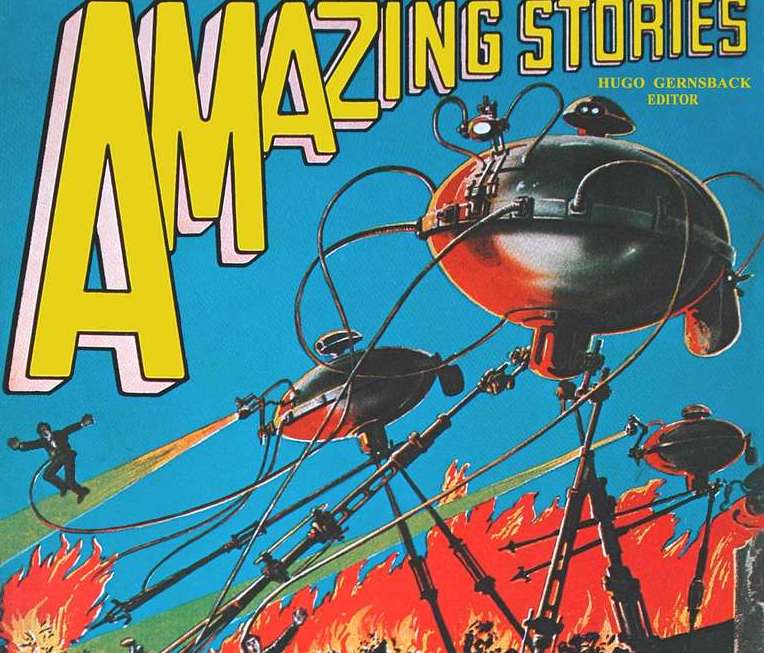
‘War of the Worlds’, H. G. Wells, Amazing Stories cover, August 1927. Image via Galactic Central, picyrl
Obviously, this self-righteous speech is intended to distract from both the West’s share of the responsibility and the fact that the figures of hostage-taker and saviour in the fatalistic Noah’s Ark scenario have tended to become indistinguishable – about as indistinguishable as ‘good’ and ‘evil’ empires, which undeniably have in common that they destroy the foundations for earthly coexistence with their violence unleashed by capitalist striving for growth and dominance.
Infantilization
On 12 April, the Noah’s Ark scenario was symbolically charged in a remarkable way. On Space Day, Vladimir Putin and Alexander Lukashenko visited a spaceport in the far east of the country, in the city of Blagoveshchensk near the border with China. The Vostochny Cosmodrome, which is under construction about 6,000 km from Moscow, is already partly in operation, for example as a launch point for Soyuz rockets. More launch pads are being built so that newer types of spacecraft, such as the Angara, can also take off there. As with most megaprojects, not everything is going according to plan, which makes it all the more important to portray Roskosmos, the space agency in charge here, as a busy, tireless force that is acting unwaveringly during a war that is also not exactly going according to plan.
At the latest since the collapse of the Soviet Union, space travel has advanced to become a global stage for the big egos of capitalism. The Ukraine invasion has also exacerbated this tendency: while the ISS as a symbolic project for cooperation has since come to appear a kind of relic, state capitalists and their counterparts in the world of capitalist states as well as in the ranks of Silicon Valley billionaire-entrepreneurs are now blatantly trying to push through their own colonial-expansionist agenda – in what is legally defined, mind you, as commons space. What all of them have in common is not least that the respective space programme stands for a habitus that is at once nostalgically transfigured and cynically aggressive: ‘Yes, I know that on Earth among the living I am one of the greatest contributors to crises such as the climate catastrophe. But I can, whenever it becomes too uncomfortable for me here, make a run for it – into space. So I dream of the untouched expanses of space, where we will soon spread out.’ Here, the capitalist drive for growth and expansion is paired with infantilism: ‘Yes, the world is in bad shape, but I don’t want to let it spoil my mood. At least not as long as I live. I just want to keep playing.’
Steven Spielberg’s cinema, which has repeatedly deployed the figure of Peter Pan, shows how the dream of flying symbolizes getting rid of unpleasant responsibilities in order to function better in capitalism. In what is probably his best-known Peter Pan story, Hook (1991), Spielberg offers the myth of a hero who can optimize himself as an entrepreneur, read: become more cunning, disruptive, and efficient, if he rediscovers the child in himself. Spielberg’s workaholic manager, who makes a career as a corporate lawyer, has obvious counterparts in Elon Musk and Jeff Bezos, since they are closely linked to the dream of flying: boys who want to be left alone with their toys in order to change the world with ‘inventions’ that emerge as if in passing (Tesla/SpaceX and Amazon/Blue Origin). Whether the world will become a better place or even quite the contrary is not the question so long as profits and growth are in sight.
Their infantilism is self-protection: the escape from the consequences of their own actions. And a social guideline at the same time: so that capitalism can continue undisturbed, everyone should be ‘like children’. Political and democratic participation? ‘Children should not have to take this burden upon themselves.’ ‘Life is managed by authorities.’ Of course, these authorities are ‘just children at heart, too’. Thus, the infantilism of the ruling class can function as a complementary counterpart to the systematic infantilization of the ruled classes, bringing both neoliberal and illiberal tendencies into an ideal tension. In the process, the emancipatory potential of being a child (or preserving one’s inner child), exposed not least by the critique of the Enlightenment, is recoded and ‘democratized’ according to chauvinist Enlightenment ideology: what was intended for the Other who was constructed as deficient and therefore always in need of education advances to become the binding agent of ‘managed democracy or post-democracy’. This would be the rationality of authoritarian capitalism, which has been gaining momentum at the latest since the financial crisis of 2007-08 and which, despite constantly deteriorating conditions of production and reproduction, promises to get the maximum out of people.
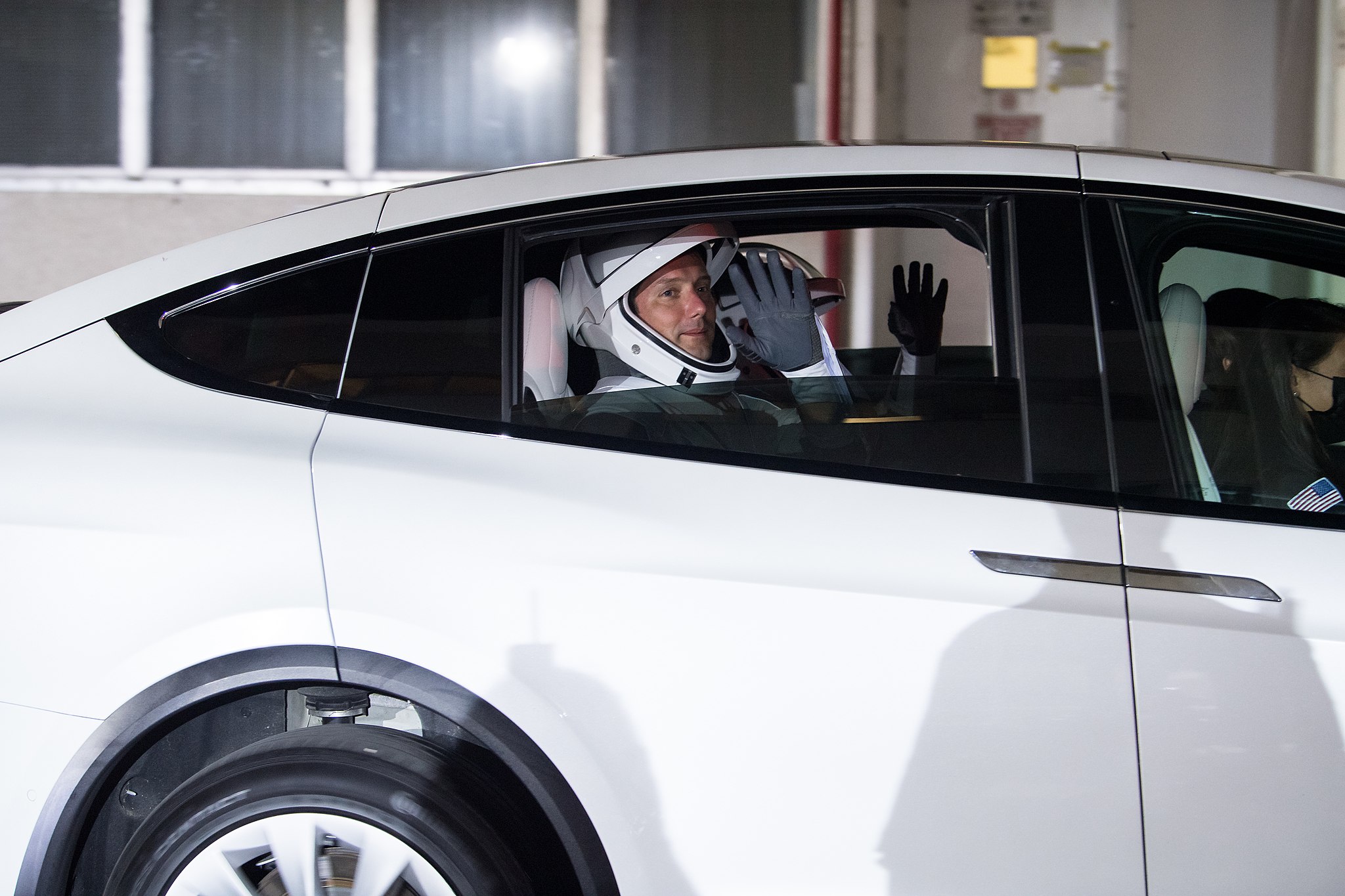
ESA (European Space Agency) astronaut Thomas Pesquet during a dress rehearsal prior to the SpaceX Crew-2 mission launch, 18 April 2021, at NASA’s Kennedy Space Center, Florida. Image by NASA/Aubrey Gemignani via Wikimedia Commons
Whoever, despite all this, can still pose the question of power from below, would have to sharpen it not only with regard to the means of production, but also to the toys of the ruling class, which stimulate – and preemptively limit – ‘our’ imagination. Otherwise, there will continue to be only regression instead of revolution; ‘negative growth or green growth’ instead of ‘degrowth’; the naturalized compulsion for an exit (liquidity event), but no exit from capitalism; downward and escalating spirals, but no plan B.
Published 2 November 2022
Original in German
First published by Springerin 3/2022
Contributed by Springerin © Magdalena Taube / Krystian Woznicki / Springerin / Eurozine
PDF/PRINTPublished in
In collaboration with
In focal points
Newsletter
Subscribe to know what’s worth thinking about.
Related Articles

How democracies transform, fast and slow
A response to John Keane
For all its acuity, John Keane’s theory of democide risks confusing democratic degradation with a transformation of the political debate. Not only that, it fails to account for the radicalization of authoritarian systems once democracy has been killed.

Given the amount of concerns we currently face, it can sometimes feel overwhelming to address the most pertinent issue that should be otherwise impossible to avoid. So how can ecological needs take their rightful place in relation to other human preoccupations?
